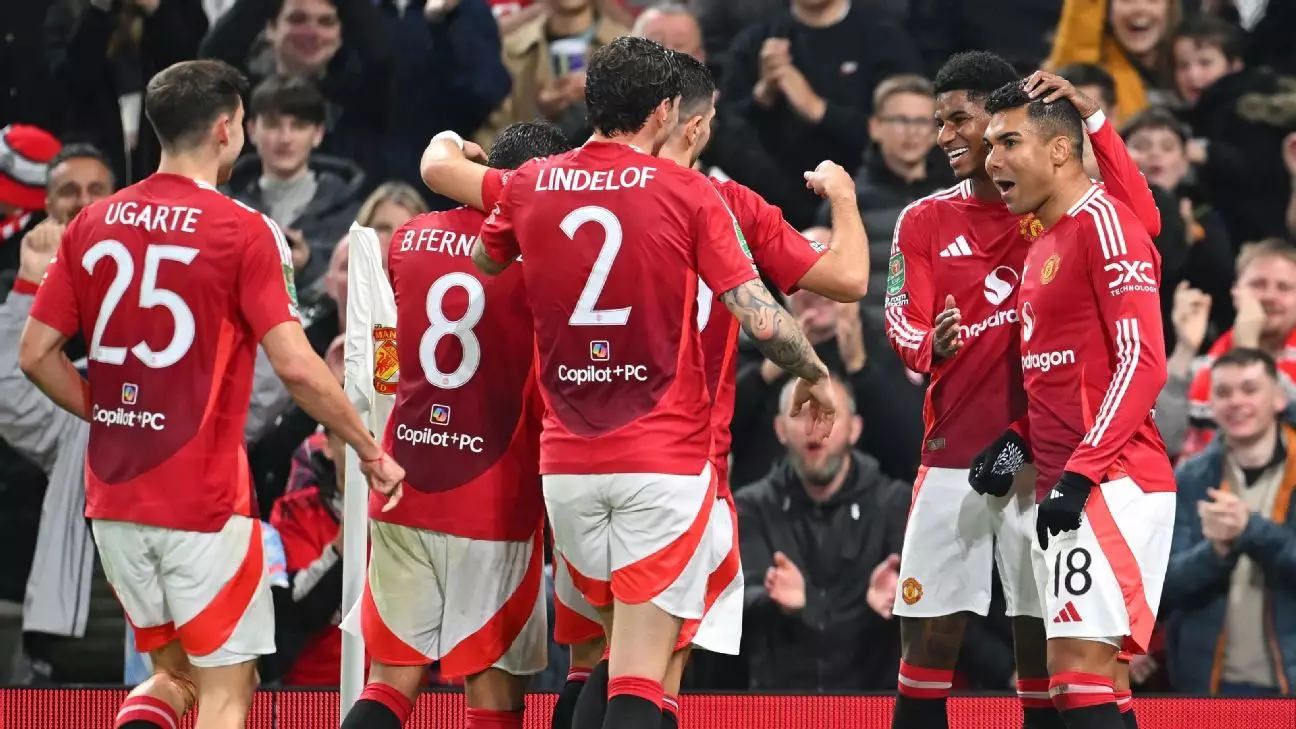In a season characterized by turmoil and underperformance, Manchester United’s recent 5-2 victory against Leicester City in the Carabao Cup can be viewed as a rare glimmer of hope. This match, which took place on the heels of Erik ten Hag’s firing, was steeped in an odd atmosphere as the interim coach Ruud van Nistelrooy and the players took to the pitch for a lap of honor. Here, they grasped for a fleeting moment of adulation from the fans despite the chaos underlying their current plight. It was an odd juxtaposition, with players celebrating a modest victory against a weakened Leicester side while the club languished at 14th place in the Premier League.
The scenario raises questions about the team’s psyche and their need for validation in a season filled with disappointment. As van Nistelrooy noted, gratitude seemed to be in the air, bolstered by “luck on our side.” However, one must question whether a solitary win, even if it offers momentary joy, can reset the trajectory of a club grappling with systemic issues.
Historically, a managerial change often injects a temporary boost in morale, leading to immediate results before the flaws of the squad resurface. This seems to be the pattern with Manchester United. Since the departure of Sir Alex Ferguson in 2013, the club has cycled through nine managers, with Ten Hag becoming the fifth permanent coaching casualty in this period. This grim statistic reflects the broader issues within the organization. Players have consistently failed to meet expectations, “killing” all managerial hopes—something that a single win over Leicester may not rectify.
As rumors swirl about Sporting CP’s Ruben Amorim potentially stepping into the managerial role, one must ponder whether van Nistelrooy’s victory was a beacon of hope or merely an illusion wrapped in temporary elation. The notion that this is a turning point for the club seems overly optimistic, especially given the familiar faces on the pitch and the similarities in tactical approaches that led to previous failures.
The triumph against Leicester was not without its flaws. In fact, while players like Casemiro and Bruno Fernandes garnered praise for their performances—especially with Casemiro’s pair of goals—Manchester United’s defensive vulnerabilities were glaring. Goals conceded to Leicester highlighted ongoing issues at the back, suggesting systemic dysfunction rather than a quick fix. The ease with which Leicester managed to threaten United’s goal, especially through players like Bilal El Khannouss and Conor Coady, underscores a worrying trend.
The defense remains imbalanced, showcasing a persistent struggle to contain opposition attacks. Moments that saw key players like Victor Lindelöf get dispossessed with alarming regularity were surely concerning for van Nistelrooy and any prospective managers watching from the sidelines. This lack of defensive stability reveals deep-seated issues that were not solved with a change in coaching, nor will they be rectified overnight.
As Manchester United contemplates their next steps, Amorim’s potential arrival signals a broad examination of not just tactical shifts but also the player roster. He must carefully analyze which elements of the current squad can be relied upon and which should be considered for departure. Even if United can manage a win against formidable teams like Chelsea, such performances must not lead the management to complacency.
The faint glimmer of success against Leicester will not obscure the fact that the unit requires significant restructuring. The questions surrounding players’ capabilities have persisted through multiple managerial tenures, leading to the conclusion that mere tactical adjustments may not suffice.
While the victory brought a modicum of joy, it would be imprudent to view it as more than a band-aid on a larger wound. As the club progresses, the need for clear leadership—both on and off the pitch—will become essential. Ultimately, Manchester United’s long-standing issues require more than sporadic victories; they demand foundational changes that align with the storied legacy of the club. The road ahead is fraught with uncertainties, and while winning may provide temporary relief, the deeper problems at Old Trafford remain waiting to be addressed.

